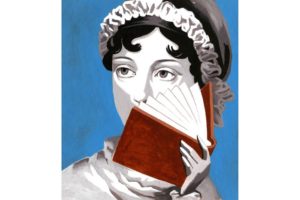WSJ Historically Speaking: Austen, Anonymous Writers and History

ILLUSTRATION: THOMAS FUCHS
It is a truth universally acknowledged that “Pride and Prejudice” by Jane Austen —who died 200 years ago this month—is one of the most romantic and popular tales ever written. Behind the global adoration she enjoys today lies the irony that in her own time Austen’s name never appeared on her books.
In “Pride and Prejudice” she was simply the author of “Sense and Sensibility,” which had carried the title “By a Lady.” Her veil of anonymity worked so well that even friends of the Austen family had no idea that dear, sweet spinster Jane was a novelist of repute. An acquaintance of her brother Henry actually told him that “Pride and Prejudice” was “much too clever to be the work of a woman.” Austen’s decision to publish anonymously was par for the course before the mid-19th century. Writing for money was akin to taking on paid work—something that few gentlemen, much less gentle ladies, would ever consider.
Authors of politically controversial tracts also frequently chose to be invisible, for reasons of safety or to let their views stand on their own. Tom Paine, author of “Common Sense,” which galvanized American public opinion in favor of revolution in 1776, kept his identity hidden for a short time after publication. “The Federalist Papers,” urging ratification of the Constitution, were famously the work of Publius, the joint pseudonym adopted by Alexander Hamilton, James Madison and John Jay.
But for a woman, there was the added burden of societal expectations regarding “female respectability,” which characterized any sort of publishing or public display of talent as not just vulgar but unchaste behavior. As Virginia Woolf declared in “A Room of One’s Own”: “I would venture to guess that Anon, who wrote so many poems without signing them, was often a woman.”
It wasn’t only fear about propriety that deterred women from writing under their own names. Despite the esteem afforded Austen, women’s writing was seldom taken seriously, as Charlotte Brontë, author of “Jane Eyre,” discovered when she sent her poetry to the poet laureate Robert Southey, who responded: “Literature cannot be the business of a woman’s life.” Brontë used the pseudonym Currer Bell to publish “Jane Eyre” in 1847, while her sister Emily published “Wuthering Heights” as Ellis Bell in the same year.
They joined a long list of women authors who felt they had to hide. Mary Shelley’s “Frankenstein” had come out anonymously in 1818, while Mary Anne Evans wrote “Middlemarch” and her other novels under the pen name George Eliot.
In theory, the great strides toward gender equality in the 20th century should have made it unnecessary for women writers to follow the same path as Austen, unless driven by personal reasons. In a 2016 interview with the Guardian, the Italian novelist Elena Ferrante claimed that her use of a pseudonym let her “concentrate exclusively and with complete freedom on writing and its strategies.”
But in practice, certain prejudices just won’t go away, making a pen name appear to be the only option. Joanne Rowling, author of the Harry Potter novels, was advised to become J.K. Rowling because, as Connie Ann Kirk’s biography puts it, “boys might frown on picking up a book by a woman.”
Virginia Woolf was more right than she knew: “Anonymous” is still often a woman.
